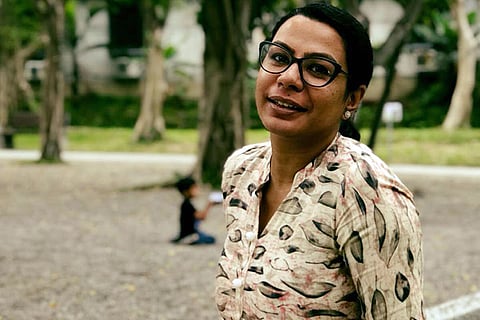

Facebook took down Kerala based artist Aysha Mahmood's post of an embroidery work from her 100 days of creativity project, where she designs feminists concepts with needlework.
The photo that Aysha had uploaded was of an embroidery in her unique style; on a checked piece of cloth, the artist has embroidered a ribbon with flowers and leaves, and the words – “Women don’t owe you shit!” The embroidery is on a table against the wall, with books, a flower and sundry other items on it. And behind the embroidery is the photograph of a bare-chested woman, staring at the camera.
Nangeli is a 19th century woman in Kerala who is believed to have fought the oppressive breast tax that upper castes levied on women from lower castes, to “allow” them to cover their breasts.
The social networking giant cited their anti-nudity policy for taking down the post, as it had in its background a photograph of the bare-chested Theeya woman Aysha had used to represent the Nangeli story. (The photograph had first appeared in a book, Castes and Tribes of Southern India by Edgar Thurston, C.I.E., published in 1909)
.jpg?w=640&auto=format%2Ccompress)
"The puzzling part is that sometime back, I had put another post of just the same picture. And although the website took it down and blocked me, on clarification, it later reinstated the post and the picture was widely shared. This time however, they just gave me a review option and blocked me from posting anything for 24 hours," says Aysha.
Aysha states that Facebook allowed a 'review' option for the post, on which she explained the historical and cultural significance of the photograph. However, there was no response and the post still remains blocked.
.jpg?w=640&auto=format%2Ccompress)
Facebook's policy states that the website will allow pictures of women actively engaged in breast feeding or showing breasts with post mastectomy scarring. However, pictures of nipples is considered objectionable and will not be allowed on the site.
"It is rather strange because men showing their nipples aren't banned on the site," says Aysha.
Aysha also points out that despite Facebook's stringent anti-nudity policy, the Facebook messenger is most times a cesspool of obscene messages and images from strangers.
"A friend of mine asked me why I took down the post. When I explained that Facebook took it down, she told me that has received pictures of male genitals from random men on Facebook. This is probably because it is messenger and not the newsfeed," she says.
Aysha also said that although Facebook allowed her post to stay for 3-4 minutes before taking down her post, she wasn't allowed to even upload her post on Instagram.
Who was Nangeli?
(Excerpts from an article by Supiya Unni Nair)
Over two hundred years ago, the southern state of Kerala had a system of taxation, whereby women belonging to backward castes and Dalits had to pay a tax, if they wanted to cover their breasts. Standing bare chested was taken as a sign of respect towards those castes supposedly "superior" to them - for both men and women.
The tax however, was levied only on lower caste women who wanted to cover their chest. It goes without saying that some of these "superiors" would have also got their voyeuristic kicks out of this system as well.

Painting by Chitrakaran T Murali. Do not reproduce without permission.
Royal officials would travel door to door, collecting this heinous "Mulakkaram" - literally Breast Tax- from Avarna women who had passed puberty. Sickeningly, the amount would depend on the size of the breasts.
Legend has it that a young Ezhava woman from Cherthala in Alappuzha, humiliated and frustrated by this indignity, decided she had enough of being insulted. Nangeli was said to have been attractive and feisty.
In 1803, when the pravarthiyar, or village collector came asking for her share, she lit a lamp and laid down a plantain leaf as per the custom, but instead of money, she cut off her breasts and placed them on the leaf, shocking the officials.
Nangeli bled to death, but her defiance has now come to be a symbol of the resistance against this practice.

Painting by Chitrakaran T Murali. Do not reproduce without permission.